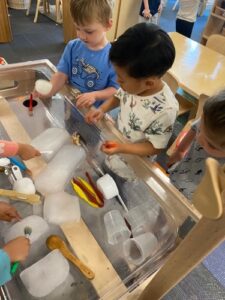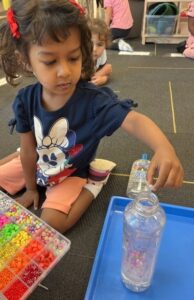The Importance of Responding to Children’s Interests and Needs
In our early childhood classrooms, you’ll often see children deeply engaged in a variety of activities – building towers, exploring sensory bins, pretending to be animals, or asking endless “why” questions. These moments aren’t just playtime; they are powerful learning opportunities driven by your child’s innate curiosity and individual needs.
We believe that one of the most effective ways to foster a love of learning and support your child’s development is by responding thoughtfully to their interests and needs. This approach might look like:
- Following Their Lead: When a child shows a strong interest in dinosaurs, we might bring in dinosaur books, provide dinosaur figurines, or even create a dinosaur-themed dramatic play area. This validates their curiosity and encourages deeper exploration.
- Acknowledging Their Questions: Those “why” questions, while sometimes repetitive, are a sign of a developing mind seeking understanding. We strive to answer them thoughtfully, perhaps by exploring a book together or conducting a simple experiment.

- Observing Individual Needs: Some children may need more quiet time, while others thrive in social interactions. We pay close attention to these individual cues and adjust our environment and activities to ensure every child feels comfortable and supported.
- Providing Choices: Offering children age-appropriate choices throughout the day, whether it’s selecting a book, choosing a learning center, or deciding how to complete a task, empowers them and fosters a sense of ownership over their learning.

- Providing Choices: Offering children age-appropriate choices throughout the day, whether it’s selecting a book, choosing a learning center, or deciding how to complete a task, empowers them and fosters a sense of ownership over their learning.

- Extending Their Learning: If a child is fascinated by building, we might introduce a variety of building materials, challenge them to create specific structures, or discuss the principles of balance and stability.

Why is this important?
- Increased Engagement: When children are interested in what they are learning, they are more focused, motivated, and eager to participate.
- Deeper Understanding: Exploring topics that resonate with them allows for more meaningful connections and a deeper understanding of concepts.
- Development of Problem-Solving Skills: Following their interests often leads to exploration and experimentation, naturally fostering problem-solving abilities.
- Enhanced Creativity and Imagination: When children feel free to explore their passions, their creativity and imagination flourish.
- Stronger Sense of Self: Recognizing and responding to their individual needs helps children feel valued, understood, and confident.
How can you support this at home?
- Observe and Listen: Pay attention to what captures your child’s attention during playtime and conversations.
- Ask Open-Ended Questions: Encourage them to elaborate on their interests by asking questions like, “Tell me more about that,” or “What makes you curious about that?”
- Provide Resources: Offer books, art supplies, or simple materials related to their current interests.
- Visit Libraries and Museums: These offer a wealth of opportunities to explore new topics.
- Engage in Their Play: Show genuine interest in what they are doing and participate when invited.
By working together, both at school and at home, we can create a learning environment that truly nurtures your child’s unique potential and fosters a lifelong love of discovery.

